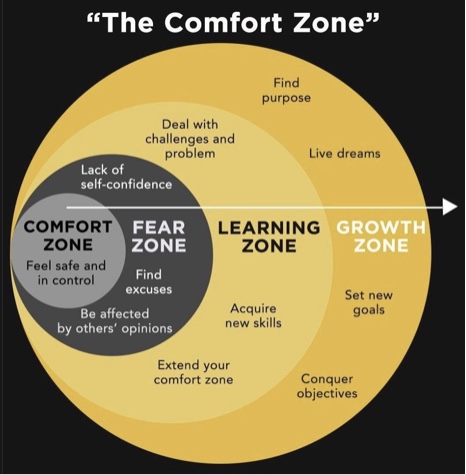Don’t go seeking conflict and confrontation, but don’t be afraid of it either. Both extremes are not good. Have a back bone and stand up for what you believe in, but do it tactfully and respectfully as to keep the negotiation going. If you shut a conversation or idea down, you’re treating it as a win-lose situation. That may be necessary for some things (hostage negotiations, for example), but if you want to have a long, meaningful relationship with that person there needs to be some “give and take.” If you always win (or lose), eventually that other person won’t want to deal with you anymore.
Author: cbarney.45
Getting out of your comfort zone

Most of the best things in life happen at the edges of your comfort zone. If you only want to feel comfort, you’ll be less likely to branch out/try new things, to overcome adversity, learn new skill sets, etc.
The higher degree of difficulty, the less comfortable most people are with trying to tackle that problem. If you’re willing (and able) to solve that problem, and if you can find a way to solve the problem for others too, you often are compensated (monetarily) for it. Most people want to stay in their comfort zones and are willing to trade money for comfort (paying someone else to solve their problems). There’s nothing wrong with this. We all do it, and depending on the stage of life we’re in, it may be a smarter financial decision to pay an expert/specialist to do something more efficiently so you’re not wasting your non-renewable resource (time) on something you don’t know how to do well and will end up with a worse finished product than if the expert did it in the first place.

Real life Inception
People are emotional, not rational. Appeal to their emotions first and then help to rationalize their decision. If you can get them to articulate how they feel about something, if you can get them to self actualize or self realize it, the idea will stick. If you tell them how to feel, they will know that the idea did not come from themselves and they will be more likely to dismiss it down the road. It’s just like the movie Inception – they have to feel like the idea originated from themselves.
No means no (for now)
No doesn’t mean no forever. It means no for now. It means not yet. It means that your current offer hasn’t enticed them enough or that they are not motivated enough to accept your offer. No isn’t the end of the discussion, it’s the beginning of the negotiation. If you really want to make a deal, don’t stop at no. Dig deeper and see what relatively minor concessions you could give to the other party (which may be of little value to you, but greatly valued by them) to sweeten the deal.
How to lose
Don’t let your competitive side get the best of you. It’s fun to win. It sucks to lose. But keep things in perspective. Unless your livelihood or your family’s livelihood depends on you winning this game/earning the contract (whether in sports or in business), it’s probably not worth losing your cool over.
Don’t flip the monopoly board, throw the controller, or punch a wall because you lost. Everyone loses something in life. That’s just how life works. If you’re not losing in something then you aren’t pushing yourself to play against the proper competition.
When you lose, lose with dignity. You’ll maintain respect. If you lose and act like a child? People will lose respect for you.